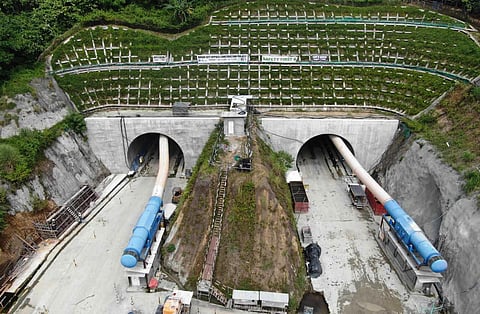
- NEWS
- the EDIT
- COMMENTARY
- BUSINESS
- LIFE
- SHOW
- ACTION
- GLOBAL GOALS
- SNAPS
- DYARYO TIRADA
- MORE

Two new infrastructures in Davao City — the Davao City Bypass Construction Project and Bucana Bridge — are nearing completion, according to the Department of Public Works and Highways (DPWH).
Once completed, the 45.5-kilometer (km) Davao City Bypass Construction Project will be the longest tunnel in the Philippines and is expected to reduce travel time between Toril and Panabo City from one hour and 44 minutes to just 49 minutes, helping to alleviate traffic congestion and boost productivity.
The DPWH reported that, as of 27 January, excavation for the northbound tunnel is over 95 percent complete, while the southbound tunnel is more than 85 percent finished.
The Davao City Bypass Construction Project is partially financed by the Government of Japan through the Japan International Cooperation Agency (JICA).
Actual work on the project began in 2017 after JICA signed Japanese loan agreements with the Government of the Republic of the Philippines in 2015.
The estimated total cost of the project was initially P46.80 billion, which was later updated to P70.8 billion.
Bucana Bridge
Expected to be completed by the third quarter of 2025, the 1.34-km Davao River (Bucana Bridge) is already 73 percent complete.
The bridge will connect the eastern and western coastal areas of Davao City, providing a major alternate route to alleviate traffic congestion in the city center and improving access to key areas across the metropolis.
DPWH Senior Undersecretary Emil Sadain said the agency is intensifying construction of the bridge to meet the target completion date by the end of November this year, marking two years since the notice to proceed was issued to contractor China Road and Bridge Corporation.
"Although recent rains in Mindanao have posed some challenges, we are confident that the Bucana Bridge will be finished ahead of schedule," Sadain said.
"Our project engineers and the contractor are committed to expediting the work," he added.
With a total contract cost of P3.126 billion, the project is funded under a China Aid Grant complemented by funding from the Philippine government.
Once completed, the four-lane bridge will accommodate up to 35,000 vehicles daily, improving traffic flow and reducing congestion in Davao City's coastal areas.
